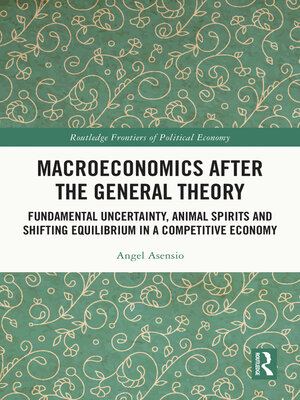Macroeconomics After the General Theory
ebook ∣ Fundamental Uncertainty, Animal Spirits and Shifting Equilibrium in a Competitive Economy · Routledge Frontiers of Political Economy
By Angel Asensio

Sign up to save your library
With an OverDrive account, you can save your favorite libraries for at-a-glance information about availability. Find out more about OverDrive accounts.
Find this title in Libby, the library reading app by OverDrive.



Search for a digital library with this title
Title found at these libraries:
| Library Name | Distance |
|---|---|
| Loading... |
Both Keynes's General Theory and orthodox economics seek to understand how competitive markets work, but they diverge sharply with respect to the nature and properties of the competitive equilibrium. The reason, as Keynes himself pointed out, is that the General Theory recognises that the future consequences of current decisions are fundamentally uncertain which, contra the orthodox view, radically affects decision-making and the functioning of markets.
This book approaches macroeconomics on the basis of the General Theory, of which a new exposition is offered in the first part, purged of the grey areas that resulted from the context in which it was written, and of the considerable confusion generated for almost a century by the vain attempts of orthodox thinking to integrate such novel ideas in its deficient conceptual framework. The second part aims at extending the conceptual framework to the open economy and considering how uncertainty affects international linkages. The third part proposes an integrated conceptual and formal framework for analysing how changes in the national and international context, including macroeconomic policies, affect an economy.
This new examination of General Theory is a major addition to the literature on Keynes, macroeconomics, economic theory and the history of economic thought.







